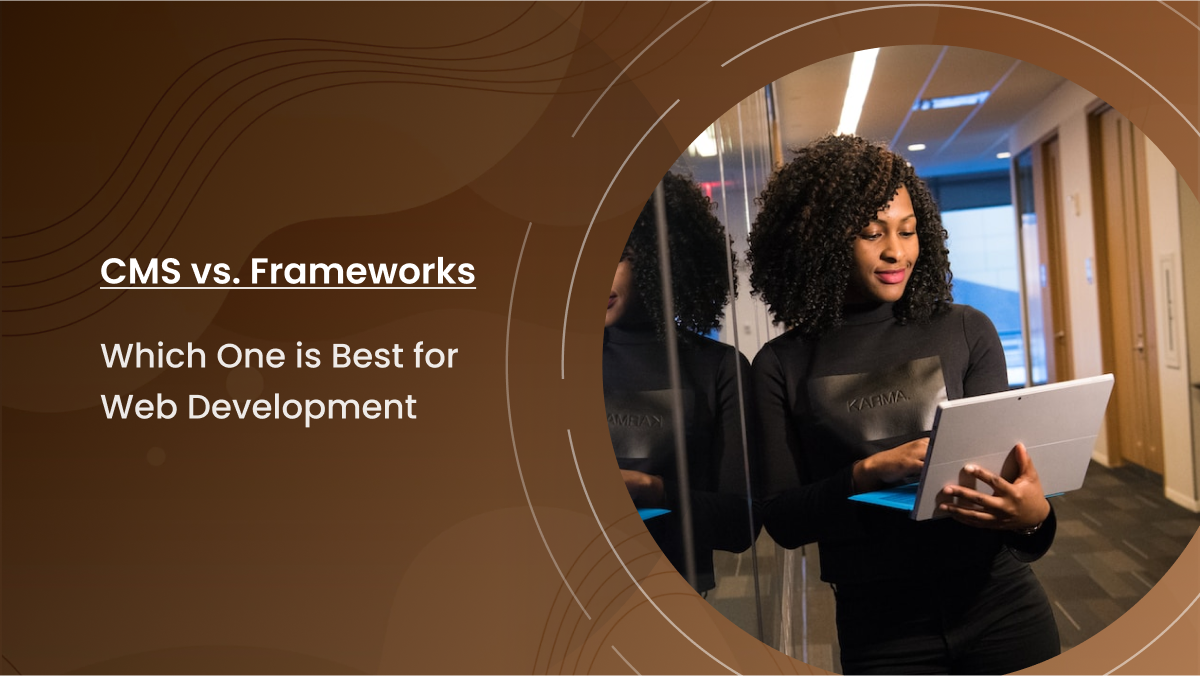Are you in a fix to decide whether to use a CMS or a framework for your web development project?
It is crucial to have a thorough understanding of the two options. If you decide without proper information, you might select a platform that does not match your company’s needs. This could lead to having to start over and make the project more expensive.
Let us discover the differences between frameworks and CMS, as well as their benefits and drawbacks. Besides, it helps in deciding which one to choose based on certain factors.
Understanding CMS
Content management system (CMS) enables you to edit and publish material on a website. Most content management systems (CMS) offer an intuitive user interface that makes it possible to generate, modify, organize, and publish information without any programming experience.
Also, it provides various options that enable you to alter the appearance and operation of your website, including themes, plugins, and integrations.
A typical CMS has two major components:
- Content management application helps you to modify and enhance your website with high-quality content.
- A content delivery application (CDA) is the technology that works in the background. It collects the content you create in the CMA and updates it. Then, it delivers it to the front part of your website, which is what your website visitors see.
The CMA and CDA collaborate to develop, monitor, and distribute digital content to users.
Commonly used CMS platforms include:
WordPress
It was introduced in 2003 and is a CMS built on PHP and MySQL. Although many platforms are introduced, it still remains one of the simplest ways to build a website.
Magento
It is mostly employed by e-commerce websites. It was first made available in 2008 and is written in PHP. It offers a comprehensive range of features and functionalities for setting up and operating webstores, including tools for marketing and SEO as well as inventory control, order processing, and payment integration.
SharePoint
Microsoft created SharePoint, a web-based platform that gives companies communication, content management, and document management solutions. It offers features like document versioning, search capabilities, and access control and is mostly used for intranet and document management systems.
Read: Global Talent Access: How Outsourcing Boosts Workforce Efficiency
Shopify
Shopify is a cloud-based e-commerce platform that offers companies the features and tools necessary to build and manage their online stores. It offers a variety of services, including customizable themes, payment processing, shipping and inventory management, and marketing and analytics tools.
Understanding The Framework
A framework is a collection of pre-written code that gives developers a starting point for robust web development. Developers may concentrate on creating special features and functionality for their application because it offers capabilities like authentication, database integration, and templating.
Model-View-Controller (MVC) architecture, which separates the application’s data, presentation, and logic, is the standard for frameworks. It is simpler to add new features and make modifications as the programme develops, thanks to this modular approach, which enables developers to build more scalable and maintainable code.
Frameworks are a great option for complicated web applications because they also come with built-in functionalities like security and scalability.
Commonly used frameworks include:
Node.js
It is the prominent open-source framework offering features such as server-side rendering, automatic code splitting, and static site generation, which make it easier for developers to build quick and scalable web applications while also improving performance.
While enhancing user experience and search engine optimization (SEO), these characteristics make it simpler for developers to create quick and scalable web applications. Moreover, Node.js provides a huge selection of libraries and plugins that make it simple to connect to and use other services, including content management systems, databases, and authentication services.
ReactJS
ReactJS is a cutting-edge web development framework that is becoming more and more well-liked among developers. ReactJS is a highly preferred frontend framework for rich UI development solutions.
Leveraging the best React libraries makes it easy for developers to achieve an engaging UI interface. Opt for adept ReactJS developers to bring out the best functionalities of the technology and attain the desired UI solutions.
Laravel
Laravel is one of the best PHP Frameworks offering robust development solutions. Laravel brings in an all-round development support as it can be easily integrated with other technologies to build potential web development solutions.
Laravel possesses SEO-Friendly features that make it the ideal choice for web development. Laravel has a huge community which can help you resolve your errors as well as even help you achieve high-quality web solutions.
Deciding factors to choose between CMS and Frameworks
When deciding between CMS and frameworks for your website, there are some crucial factors to consider.
Purpose
CMS comes into existence for managing content and is easy for non-technical users to operate. They come with a ready-made interface and administration panel for managing website content. On the other hand, frameworks are designed for developers to build custom web applications with more control over the codebase.
Learning curve
CMS are simpler to learn and use because they come with a pre-built interface and require less coding knowledge. Frameworks, however, demand a higher level of technical expertise since developers must create unique solutions from the beginning.
Flexibility
Web frameworks are usually more flexible than CMS. This is because web frameworks give developers greater control over the design and functionality of the website. With a web framework, you have more control over the code of the site and can customize it to meet specific needs.
Ease of use
Compared to web frameworks, CMS is typically simpler to use. This is due to CMS’s user-friendly user interfaces and minimal or no coding skills requirements. In comparison, using web frameworks requires a greater level of technical expertise and understanding.
Customization
Since CMS rely on pre-made templates and modules, customization options are typically more confined. With greater customization choices provided by frameworks, web application developers can create special features and functionality.
Scalability
Small- to medium-sized websites are typically better suited for CMS, since larger, more complicated websites can cause them to slow down and become more challenging to administer. Frameworks are more scalable since they can handle higher volumes of data and can be performance optimized.
Maintenance
CMS are often simpler to manage because the CMS supplier regularly releases updates and security patches. While developers are in charge of maintaining and safeguarding the codebase, frameworks require more constant upkeep.
Cost
Due to the frequent availability of pre-built templates and modules, CMS can be less expensive to implement. Frameworks need more time and knowledge to develop, which might raise the total cost of implementation.
Conclusion
CMS performs best for content-focused websites with simple requirements, whereas frameworks are the best technology stack for web application development that are complex and need greater customization as well as control over the codebase. The right choice completely depends upon the business requirements. Once you have a clear idea on your project requirements, budget and expectations with the developed solutions then it will be easy to choose the ideal one between a framework and a CMS for your website development project.



